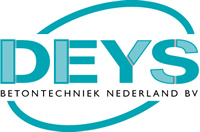 |
Deys Betontechniek Nederland BV Gelreweg 5, 3843 AN Harderwijk Postbus 330, 3840 AH Harderwijk http://www.deys.nl Telephone +31 (0)341 41 51 48 (24 hr / day) Fax (0341) 42 54 90 info@deys.nl |
BETEC 860 Floortop
| Description |
|---|
BETEC 860 is a mortar based on Portland cement, reinforced with steel fibres, which is applied in constructions that carry heavy loads. Because of the application of steel fibres, which are added to the dry mortar beforehand in the factory, the material obtains very high flexural, tensile and splitting strengths. |
| Type | Grain structure | |
|---|---|---|
| 860 | 0-4 | |
| 860 | 0-16 |
| Quality control |
|---|
During manufacturing only high-quality aggregates are used, which meet the strictest requirements. During the production process as well as during the final stages these materials are extensively tested for quality, not only in our own laboratory, but also in independent acknowledged institutes. |
| Application areas | Advantages |
|---|---|
|
|
| Packaging and storage |
|---|
| 25 kg bags. Dry and frostproof, storage life 12 months in the original and closed package. |
| Precautions |
|---|
| Refer to safety sheets. |
| Article Code | 860 |
|---|---|
| Kind of mortar | trowel mortar |
| Type of mortar [mm] | 4/ 16 |
| Thickness of layer | > 15 mm |
| Class of strength | K70 |
| Environmental degree | xo t/m xa3 |
| Application class | RC1 |
| Desiccation shrinkage | |
| • after 7 days [mm/m] | 0.54 |
| • after 91 days [mm/m] | < 1.2 |
| (measurement of shrinkage on experimental patches that received no curing) | |
| Water penetration | < 10 mm |
| Resistance to frost and gritting material (salt)(25 cycles) [mg/mm²] | < 0.4 |
| Carbonatation depth (91 days) [mm] | < 2 |
| Halogen content [%] (m/m) | < 0.05 |
| Thermic expansion coëfficient [°C] | < 15 x 10-6 |
| Polymer content | not applicable |
| Water segregation (bleeding) | none |
| Volume increase [%] | > 0.1 en < 2.0 |
| Min. processing temperature ** [°C] | 5 |
| Max. processing temperature [°C] | 35 |
| Rel. humidity foundation soil | moderately damp |
| Bond strength to concrete [N/mm²] | >2 |
| Flexural-tensile strength (brl 5060) | NEN.EN 14651 |
| Water dosage | refer to front of package |
| E-module (N/mm²] | 43000 |
| Calculation of amount of dry mortar [kg/m³] | 2200 |
| Density of mixed mortar (kg/dm³) | 2.42 |
| Compressive strength [N/mm²](20°C) | |
| • 1 day | 71.0 |
| • 7 days | 107.0 |
| • 28 days | 128.0 |
| • 90 days | 135.0 |
| Flexural-tensile strength [N/mm²] (20°C) | |
| • 1 day | 16.1 |
| • 7 days | 18.1 |
| • 28 days | 19.7 |
| • 90 days | 21.4 |
Complies with CUR recommendation 54 ** All temeratures below 5ºC measures for winter conditions must be taken (material applicable till -5ºC)
| Processing advice |
|---|
General Processing Advice Trowel and wet guniting grouts (cement-bound) [B]Preliminary treatment of the ground Pre-moistening of the ground Mixing
Note: in order to obtain a polymer modified repair mortar (PCC), polymer dispersion BETEC 410 should be added to the mixing water; the ratio depends on the application: 5 to 3 parts water for 1 part BETEC 410. It is also possible to use PCC mortars which are ready for use - refer to our technical staff concerning this. Processing
Curing Packaging and storage Health & Safety |
Liability
The technical instructions and recommendations we provide on the basis of our experience and to the best of our knowledge, are entirely without obligation and merely provide an indication. Not all facts, problems and queries that occur during practical application can be included in a general documentation sheet. Our recommendations and instructions do not commit us to any legal obligations as a result of the purchase and application of our products. Any deviating agreements made by our employees that are not included in our datasheets will only be lawful providing they have been confirmed in writing by the management. Our raw materials, semi-finished products and products comply with the most stringent quality standards. This does not relieve the user of their responsibility to test our products prior to their application. Our general trading and delivery conditions, which we are happy to forward to you on demand, are and remain applicable at all times.
This specification sheet supersedes any previous versions.